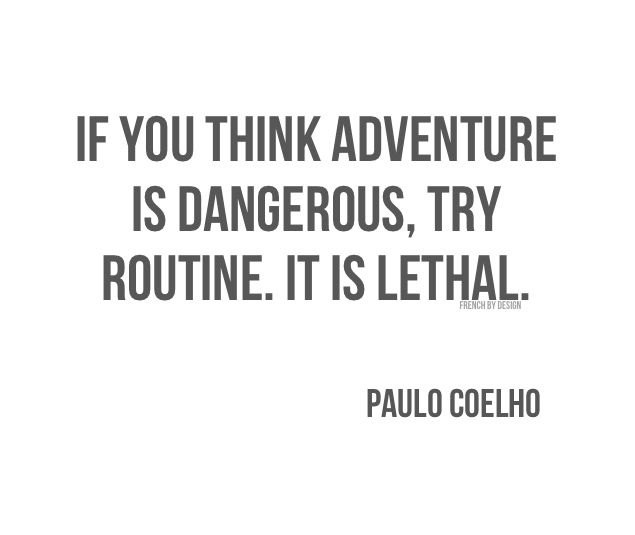Word-Of-the-Week #934: Routine
June 30, 2022 by Susan Clarke · Comments Off on Word-Of-the-Week #934: Routine
Routine – what you do every day that is habitual, unvarying, and unimaginative.
How much of your day feels habitual, unvarying, and unimaginative? How would it feel to instead have everyday filled with interesting and enjoyable experiences?
This week features the 5 Benefits of an Inquiring Mind from “The Power of Curiosity. Discover how cultivating an inquiring mind can help you lead a happier, healthier life,” by Todd Kashdan. His follow up excerpts, “Curiosity is something that can be nurtured and developed. With practice, we can harness the power of curiosity to transform everyday tasks into interesting and enjoyable experiences. We can also use curiosity to intentionally create wonder, intrigue and play out of almost any situation or interaction we encounter. It all starts with wanting to know more.
5 Benefits of an Inquiring Mind
Curiosity, at its core, is all about noticing and being drawn to things we find interesting. It’s about recognizing and seizing the pleasures that novel experiences offer us, and finding novelty and meaning even in experiences that are familiar.
When we are curious, we see things differently; we use our powers of observation more fully. We sense what is happening in the present moment, taking note of what is, regardless of what it looked like before or what we might have expected it to be.
We feel alive and engaged, more capable of embracing opportunities, making connections, and experiencing moments of insight and meaning — all of which provide the foundation for a rich, aware and satisfying life experience.
5 of the important ways that curiosity enhances our well-being and the quality of our lives:
- Health – In a 1996 study published in Psychology and Aging, more than 1,000 older adults aged 60 to 86 were carefully observed over a five-year period, and researchers found that those who were rated as being more curious at the beginning of the study were more likely to be alive at its conclusion, even after taking into account age, whether they smoked, the presence of cancer or cardiovascular disease, and so on.
- Intelligence – Studies have shown that curiosity positively correlates with intelligence. In one study published in the Journal of Personality and Social Psychology in 2002, researchers correctly predicted that high novelty-seeking (or highly curious) toddlers would have higher IQs as older children than toddlers with lower levels of curiosity. Researchers measured the degree of novelty-seeking behavior in 1,795 3-year-olds and then measured their cognitive ability at age 11. As predicted, the 11-year-olds who had been highly curious 3-year-olds later scored 12 points higher on total IQ compared with low stimulation seekers. They also had superior scholastic and reading ability.
Other studies have shown that high levels of curiosity in adults are connected to greater analytic ability, problem-solving skills and overall intelligence. All of which suggests that cultivating more curiosity in your daily life is likely to make you smarter.
- Social Relationships – It is far easier to form and maintain satisfying, significant relationships when you demonstrate an attitude of openness and genuine interest. One of the top reasons why couples seek counseling or therapy is because they’ve become bored with each other. This often sparks resentment, hostility, communication breakdowns and a lack of interest in spending time together (only adding to the initial problem). Curious people report more satisfying relationships and marriages. Happy couples describe their partners as interested and responsive.
- Happiness – In one of the largest undertakings in the field of psychology, two pioneers in the field of positive psychology, Martin Seligman, PhD, and Chris Peterson, PhD, devised a scientific classification of the basic human strengths. This system was the end result of reading the works of ancient philosophers, religious texts and contemporary literature, then identifying patterns, and finally subjecting these ideas to rigorous scientific tests. Their research eventually recognized 24 basic strengths. And, of those 24 strengths that human beings can possess, curiosity was one of the five most highly associated with overall life fulfillment and happiness.
There are other important relationships between curiosity and happiness. In his book Stumbling on Happiness (Knopf, 2006), Harvard University psychology professor Daniel Gilbert, PhD, shows that, while we think we know what will make us happy in the future, we are actually less likely to find joy as a result of a planned pursuit than by simply stumbling upon it. It follows that by cultivating curiosity and remaining open to new experiences, we increase our likelihood of encountering those surprising and satisfying activities.
- Meaning – If we are going to find a meaningful purpose or calling in life, chances are good we will find it in something that unleashes our natural curiosity and fascination. Indeed, curiosity is the entry point to many of life’s greatest sources of meaning and satisfaction: our interests, hobbies and passions.
While being passionate about something naturally renders you curious to know as much as you can about it, it also works the other way around: The more curiosity you can muster for something, the more likely you are to notice and learn about it, and thus the more interesting and meaningful it will become for you over time. The greater the range and depth of our curiosity, the more opportunities we have to experience things that inspire and excite us, from minute details to momentous occasions.”
This week is all about creating a routine of curiosity. Would you like to be smarter? How about having better health as you age? How willing are you to being more open to new experiences?
Stay Tuned! Next week 4 strategies to help you “Tune in to Your Curiosity.”
I LOVE feedback! Join my Facebook community on my FUN-damentals Fan Page.
Word-Of-the-Week #933: Curiosity
June 23, 2022 by Susan Clarke · Comments Off on Word-Of-the-Week #933: Curiosity
Curiosity – noticing and being drawn to things we find interesting; inquisitiveness.
How curious are you? Do you take time to actually notice your surroundings? How often are you drawn to things you find interesting or question?
This week features “The Power of Curiosity. Discover how cultivating an inquiring mind can help you lead a happier, healthier life,” by Todd Kashdan. He writes, “What do you want most in life? For the vast majority of us, the answer is “to be happy.”In a 2007 survey of more than 10,000 people from 48 countries published in Perspectives on Psychological Sciences, happiness was viewed as more important than success, intelligence, knowledge, maturity, wisdom, relationships, wealth and meaning in life.
Happiness is a good thing. Yet, both in my professional research and in my personal experience, I’ve observed that when we focus solely on what we think will make us happy, we can lose track of what actually does.
In 2007 the Princeton economist Alan Krueger, Nobel Laureate Daniel Kahneman and their colleagues published a paper called “Are We Having More Fun Yet?”( I REALLY like the title!)They posed this question: Have the social progress, economic prosperity and technological advancements of the past 50 years changed the quality of our lives? Have these new opportunities allowed us to spend more time doing what we care about most, thus increasing our satisfaction and meaning in life?
For most of us, the answer is no. The majority of Americans spend less than 20 percent of each day doing what could be termed very engaging, enjoyable and meaningful activities (such as talking with close friends, bonding with loved ones, creating, playing, or pursuing a spiritual practice). Instead, most of our time and energy are spent either engaged in unsatisfying work activities and chores (commuting, standing in line at the post office, fixing broken appliances), or decompressing in ways that bring neither joy nor challenge (watching TV, snacking or just “doing nothing”).
It doesn’t have to be this way, though — if we’re willing to shake up our pursuit of happiness by introducing some elements of surprise.
One of the most reliable and overlooked keys to happiness is cultivating and exercising our innate sense of curiosity. That’s because curiosity — a state of active interest or genuinely wanting to know more about something — creates an openness to unfamiliar experiences, laying the groundwork for greater opportunities to experience discovery, joy and delight.
Curiosity is something that can be nurtured and developed. With practice, we can harness the power of curiosity to transform everyday tasks into interesting and enjoyable experiences. We can also use curiosity to intentionally create wonder, intrigue and play out of almost any situation or interaction we encounter.
It all starts with wanting to know more.
- The Power of Curiosity
Curiosity, at its core, is all about noticing and being drawn to things we find interesting. It’s about recognizing and seizing the pleasures that novel experiences offer us, and finding novelty and meaning even in experiences that are familiar.
When we are curious, we see things differently; we use our powers of observation more fully. We sense what is happening in the present moment, taking note of what is, regardless of what it looked like before or what we might have expected it to be.
We feel alive and engaged, more capable of embracing opportunities, making connections, and experiencing moments of insight and meaning — all of which provide the foundation for a rich, aware and satisfying life experience.
I don’t know about you but I LOVE the joy & delight of unfamiliar experiences & surprises! This week focus on having more curiosity. What genuinely interests you? What would you like to know more about? Are you open to having unfamiliar experiences?
Stay Tuned! Next week the 5 Benefits of an Inquiring Mind.
I LOVE feedback! Join my Facebook community on my FUN-damentals Fan Page.
Word-Of-the-Week #932: Connection
June 16, 2022 by Susan Clarke · Comments Off on Word-Of-the-Week #932: Connection
Connection – the act of creating a relationship.
When was the last time you had a meaningful conversation with someone in person? How much time each month do you spend helping others? Do you realize how important relationships are in adding to your overall happiness?
Here are more excerpts on “The Habits Of Supremely Happy People” from The Huffington Post.
Martin Seligman, the father of positive psychology, theorizes that while 60 percent of happiness is determined by our genetics and environment, the remaining 40 percent is up to us. And he says happy people have habits you can introduce into your everyday life that may add to the bigger picture of bliss.
- They devote some of their time to giving.
Even though there are only 24 hours in a day, positive people fill some of that time doing good for others, which in return, does some good for the do-gooders themselves. A long-term research project called Americans’ Changing Lives found a bevy of benefits associated with altruism: “Volunteer work was good for both mental and physical health. People of all ages who volunteered were happier and experienced better physical health and less depression,” reported Peggy Thoits, the leader of one of the studies.
Givers also experience what researchers call “the helper’s high,” a euphoric state experienced by those engaged in charitable acts. “This is probably a literal “high,” similar to a drug-induced high,” writes Christine L. Carter, Ph.D. “The act of making a financial donation triggers the reward center in our brains that is responsible for dopamine-mediated euphoria.”
- They nix the small talk for deeper conversation.
Nothing wrong with shootin’ the you-know-what every now and then, but sitting down to talk about what makes you tick is a prime practice for feeling good about life. A study published in Psychological Science found that those who take part in more substantive conversation and less trivial chit chat experienced more feelings of satisfaction.
“I wish I’d had the courage to express my feelings,” is one of the top five regrets of the dying — a sentiment that hints at the fact that people wish they’d spent less time talking about the weather and more time delving into what it is that makes their heart swell.
- They make a point to listen.
“When you listen you open up your ability to take in more knowledge versus blocking the world with your words or your distracting thoughts,” writes David Mezzapelle, author of Contagious Optimism. “You are also demonstrating confidence and respect for others. Knowledge and confidence is proof that you are secure and positive with yourself thus radiating positive energy.” Good listening is a skill that strengthens relationships and leads to more satisfying experiences. A good listener may walk away from a conversation feeling as if their presence served a purpose, an experience that is closely connected with increased well-being.
- They uphold in-person connections.
It’s quick and convenient to text, FaceTime and tweet at your buddies. But spending the money on a flight to see your favorite person across the country has weight when it comes to your well-being. “There’s a deep need to have a sense of belonging that comes with having personal interactions with friends,” says John Cacioppo, Ph.D., the director of the Center of Cognitive and Social Neuroscience at the University of Chicago. Social media, while it keeps us in touch, doesn’t allow us to physically touch, which harvests the warm-and-fuzzies and even decreases feelings of anxiety.”
This week’s focus is on connection. How open and receptive are you to listening to those around you? When is the last time you took a trip to see a special friend? How often do you express your deepest true feelings?
I LOVE feedback! Join my Facebook community on my FUN-damentals Fan Page.
Word-Of-the-Week #931: Exuberance
June 9, 2022 by Susan Clarke · Comments Off on Word-Of-the-Week #931: Exuberance
Exuberance – joyful enthusiasm!
This week I am taking a vacation day 😊 And the word that came to mind for me to rerun was exuberance. I LOVE the feeling of “joyful enthusiasm.” And my goal is to live each day of my life with as much exuberance that is possible. (Even in these very trying times!)
How would you rate your “exuberance factor” on a scale of 1 to 10? How often do you feel joyful enthusiasm?
So how do you get and keep exuberance? I did a little research and found “The Habits Of Supremely Happy People” from The Huffington Post.
“Martin Seligman, the father of positive psychology, theorizes that while 60 percent of happiness is determined by our genetics and environment, the remaining 40 percent is up to us.
In his 2004 Ted Talk, Seligman describes three different kinds of happy lives: The pleasant life, in which you fill your life with as many pleasures as you can, the life of engagement, where you find a life in your work, parenting, love and leisure and the meaningful life, which “consists of knowing what your highest strengths are, and using them to belong to and in the service of something larger than you are.”
After exploring what accounts for ultimate satisfaction, Seligman says he was surprised. The pursuit of pleasure, research determined, has hardly any contribution to a lasting fulfillment. Instead, pleasure is “the whipped cream and the cherry” that adds a certain sweetness to satisfactory lives founded by the simultaneous pursuit of meaning and engagement.
And while it might sound like a big feat to tackle great concepts like meaning and engagement (pleasure sounded much more doable), happy people have habits you can introduce into your everyday life that may add to the bigger picture of bliss. Joyful folk have certain inclinations that add to their pursuit of meaning — and motivate them along the way.
life that may add to the bigger picture of bliss. Joyful folk have certain inclinations that add to their pursuit of meaning — and motivate them along the way.
- They surround themselves with other happy people.
Joy is contagious. Researchers of the Framingham Heart Study who investigated the spread of happiness over 20 years found that those who are surrounded by happy people “are more likely to become happy in the future.” This is reason enough to dump the Debbie Downers and spend more time with uplifting people.
- They smile when they mean it.
Even if you’re not feeling so chipper, cultivating a happy thought — and then smiling about it — could up your happiness levels and make you more productive, according to a study published in the Academy of Management Journal. It’s important to be genuine with your grin: The study revealed that faking a smile while experiencing negative emotions could actually worsen your mood.
- They cultivate resilience.
According to psychologist Peter Kramer, resilience, not happiness, is the opposite of depression: Happy people know how to bounce back from failure. Resilience is like a padding for the inevitable hardship human beings are bound to face. As the Japanese proverb goes, “Fall seven times and stand up eight.”
- They try to be happy.
Yep — it’s as simple as it sounds: just trying to be happy can boost your emotional well-being, according to two studies recently published in The Journal of Positive Psychology. Those who actively tried to feel happier in the studies reported the highest level of positive moods, making a case for thinking yourself happy.”
This week is all about having exuberance. Do you surround yourself with happy people? How often do you smile? How good are you at bouncing back from a failure? Do you actively try to feel happy?
Stay tuned! I will follow up next week with more habits of exuberant human beings.
I LOVE feedback! Join my Facebook community on my FUN-damentals Fan Page.
Word-Of-the-Week #930: Shush
June 2, 2022 by Susan Clarke · Comments Off on Word-Of-the-Week #930: Shush
Shush – to silence or calm.
Do you talk to yourself like you would a good friend? Do you believe that with age comes wisdom?
This week features excerpts from Parade Magazine “Never Say “I’M TOO OLD FOR THAT!” How to shush your negative inner voice and think positively” by Paula Spencer Scott.
“We all have a voice in our heads. It reminds us what’s on the grocery list, rehearses what to say next, encourages good choices and psyches us up. But sometimes that inner voice causes more harm than good. It might say, I’m too old for that! I’m not good enough. Who do you think you are? They’ll never hire you. Or, OMG, what if what if what if what if…!
The truth is, when it comes to your inner voice, “bad is stronger than good,” says University of Michigan psychologist Ethan Kross, author of Chatter: The Voice in Our Head, Why It Matters, and How to Harness It. “We’re wired to notice the negative stuff more.”
That can undermine reasoning and decision-making skills (older adults who believe stereotypes about aging are more likely to do worse on cognitive tests).
Negative mental chatter can spiral to anxiety and depression, Kross says. Replaying a worry in your head stimulates a stress response, over and over. At toxic levels, this can lead to inflammatory conditions like cardiovascular disease and cancer. In fact, repetitive negative thinking has been linked to faster cognitive decline. On the other hand, a 2018 study found that people who held positive age beliefs were 49 percent less likely to develop Alzheimer’s, even if they had a high-risk gene for it. Read on to shush your negative inner voice.
- Talk to yourself like you would a good friend.
Use your own name and the word “you.” You’ll bring so much good experience to that job, Jane! “The links in the mind are incredibly tight, so when you refer to yourself the way you refer to others, you’re thrust into adviser mode. You shift perspective and it’s easier to wade through difficulties,” Kross says.
- Think about how you’ll feel tomorrow.
Shifting to a future view highlights the impermanence of present woes. “I’ll say to myself, Ethan, how are you going to feel about it in the morning?”
- Talk to someone who will broaden your perspective.
Venting may feel good in the moment. But avoid passive listeners or like-minded friends. It’s more productive to go over things with a confidante who’ll help you broaden your perspective and think through options.
- Reframe your situation as a challenge – not a threat.
For example, focus on how getting older brings wisdom and new opportunities, rather than on losses.
- Stop doomscrolling.
We’ve been living through “the biggest chatter period of the last 100 years,” Kross says. All that negative chatter – Political polarization, the pandemic, inflation and war brought two feelings that weaken our inner cheerleader: uncertainty and lack of control. Is it any wonder that there have been spikes in road rage and general incivility?”
- Get outside
Green spaces reset our attention, which negative chatter depletes. Outdoors, we often feel the emotion of awe, being in the presence of something vast or indescribable (the Grand Canyon, a tree, a cathedral). Awe triggers us to think beyond ourselves—and magically shrinks the pesky voice in our head, Kross says.
This week’s focus is to shush. Do you have a confidante that broadens your perspective? Can you let your inner voice focus on the positive instead of the negative? Have you ever asked yourself how you’ll feel about it tomorrow or next week or next year?
I LOVE feedback! Join my Facebook community on my FUN-damentals Fan Page.





